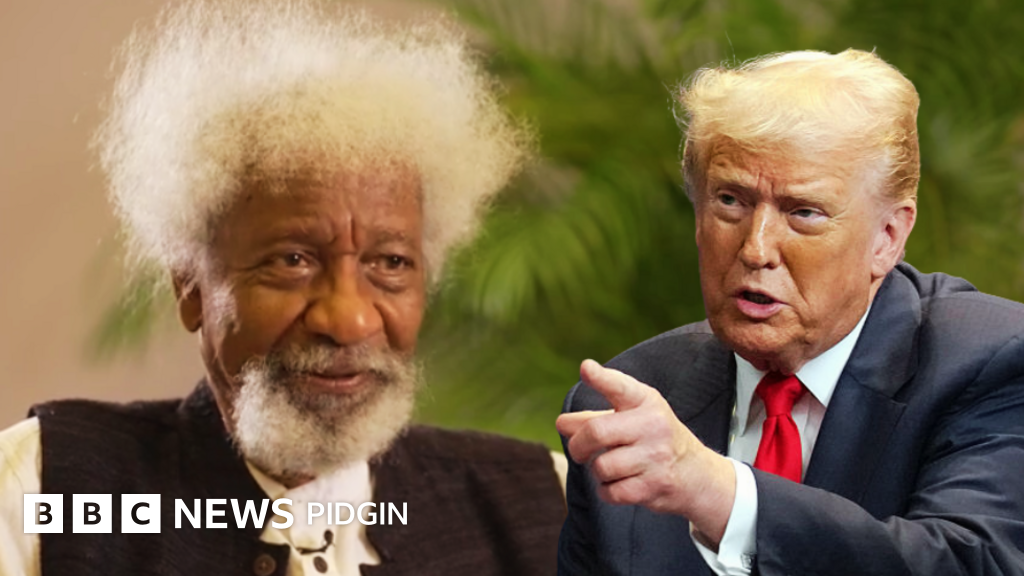The Clash of Titans: Wole Soyinka and Donald Trump
Background and Context
Wole Soyinka, the celebrated Nigerian playwright, poet, and Nobel laureate, has long been a potent voice in global politics and culture. His outspoken criticism of leaders whom he deems authoritarian has cemented his reputation as a fearless advocate for freedom and justice. Recently, this advocacy has led to a significant diplomatic incident: the revocation of his U.S. visa after he referred to former President Donald Trump as a “petty-minded dictator.”
The Visa Revocation
In a recent interview with BBC, Soyinka revealed that the U.S. government took the drastic measure of cancelling his non-immigrant visa, a step he attributes directly to his comments about Trump. This unexpected decision has left many questions in its wake about political expression and the potential repercussions for dissenting voices, especially those from abroad.
Soyinka noted that the visa was first issued last year, and now, he has been instructed to reapply should he wish to visit the United States. The revocation letter he received indicated that certain facts were not available when his visa was issued, raising eyebrows about the transparency of the decision-making process.
Comparison to Historical Figures
During his conversation, Soyinka drew a stark parallel between Trump and Idi Amin, the infamous Ugandan dictator known for his brutal regime. This comparison underscores the extent of Soyinka’s disapproval and his deep worry about the trajectory of American governance under Trump. He expressed concern that Trump’s actions reflect a broader pattern of authoritarianism that stifles free thought and expression.
The Prophetic Warning
Soyinka has not shied away from making bold predictions about Trump’s presidency. Even before Trump took office, he warned that the new administration would seek scapegoats and foster division. Thousands of voices echoed his sentiments, yet many dismissed his warnings as alarmist. Reflecting on this disbelief, Soyinka lamented, “I don’t like to be kicked out; I’d prefer to kick myself out, as it feels more dignified.”
This foresight extended to concerns over immigrant rights. Soyinka expressed deep fears that Trump would target immigrants, calling it a pattern he anticipated based on Trump’s inflammatory rhetoric during the election campaign.
Personal Reactions and Actions
In 2017, upon Trump’s inauguration, Soyinka made a symbolic gesture by tearing up his Green Card. This act was not just a personal statement but also a response to what he perceived as a growing atmosphere of racism and hostility towards minorities in America. He described the campaign discourse he witnessed as “racist rhetoric unlike anything I had encountered,” alarming him about the potential implications for civil rights under a Trump presidency.
In his view, the change in the political climate was evident: “During Obama’s campaign, there was an unmistakable sense of hope, but Trump’s emergence marked a turning point toward a darker reality.”
The Cancellation Process
The process of cancelling the visa itself was rife with absurdities. Initially mistaking the cancellation letter for a love letter, Soyinka soon recognized its serious implications. His disbelief transformed into concern when he understood that the U.S. government was auditing his tax filings, which he suspected contributed to the visa revocation.
He humorously recounted how he thought he might be targeted in a scam rather than tackled by an official decree, illustrating the unusual nature of the circumstances surrounding his visa’s cancellation. The mix of personal anecdotes with serious political discourse provides a striking glimpse into the often-unpredictable intersections of art, politics, and personal life.
Navigating the Aftermath
Following the cancellation, Soyinka attempted to traverse the complexities of U.S. immigration policy by seeking a temporary B visa, emphasizing the respect he received during that interaction. Yet, this new visa has itself sparked controversy, raising questions about access and the right to free speech for foreign critics of American politics.
Through his narrative, Soyinka embodies the struggle of being a critical voice in a world where political allegiances and personal freedoms are frequently at odds. His experiences reflect broader issues affecting artists and intellectuals today as they navigate increasingly polarized political landscapes.
The Broader Implications
This incident serves as a touchstone for discussions surrounding free speech, the treatment of dissenting voices in periods of political upheaval, and the responsibilities of international institutions regarding individual liberties. Soyinka’s situation illuminates the precarious balance between political criticism and the consequences that often accompany it, particularly for those whose voices resonate beyond national borders.
In sharing his story, Wole Soyinka has not just highlighted his own plight but has also raised crucial questions about the nature of democracy, the boundaries of free speech, and the impact of leadership styles on global citizenship. His ongoing journey continues to inspire and provoke thought in a world grappling with the tensions between power and personal expression.



